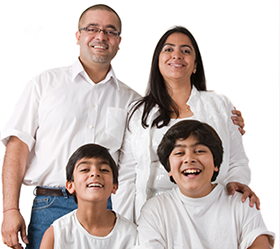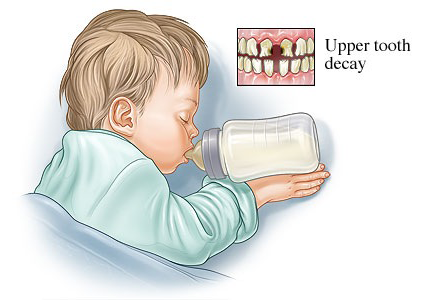Child Care Dentistry
Your Child's Dental Health Is Our Top PriorityBaby's first teeth – Comforting the child.
As teeth begin to emerge, some babies may have sore or tender gums. Rubbing your child's gums with a clean wet gauze or cotton or finger may relieve some of the soreness.
Care for your baby’s teeth :
Your child's milk teeth are important in helping your child chew and speak normally.
In addition, the primary teeth hold the space in the jaws for the permanent teeth.
Both primary and permanent teeth give shape and form to the face.
A baby's front four teeth usually erupt first, typically at about six months of age.
Exception : Some children don't have their first tooth until 12 or 14 months.
Almost children around 3 years have full set of 20 primary teeth.
As your child grows, the jaws also grow, making room for the permanent teeth that will begin to
erupt at about age six.At the same time, the roots of the primary teeth begin resorb and the permanent teeth under them
begin to erupt.Typically, children have the majority of their permanent teeth around 12 to 14 years of age.
The remaining four permanent molars, often called “wisdom teeth”, erupt around age 21.

First dental visit
As your child's first tooth erupts, schedule the first dental visit. It is advantageous if the first dental visit occurs within six months after the first tooth erupts, but not later than one year of age.

Preventing decay of milk teeth
As soon as teeth appear in the mouth, decay can occur. One of the risk factors for early childhood cavities (sometimes called baby bottle tooth decay) is frequent and prolonged exposure of a baby's teeth to liquids containing sugar, like sweetened water and fruit juice and potentially milk, breast milk. Tooth decay can occur when parents put a baby to bed with a bottle or use one as a pacifier for a fussy baby. Encourage children to drink from a cup by their first birthday. If you give your child a pacifier, use a clean one. Never dip a pacifier in sugar or honey before giving it to a baby. Encourage healthy eating habits. This would include a diet with plenty of vegetables and fruits and whole grains.

Permanent teeth
Sometimes a primary tooth is lost before the permanent tooth beneath it is ready to erupt. If a primary tooth is lost too early because of cavities or injuries, nearby teeth can tip or shift into the vacant space.
When the permanent tooth is ready to emerge into the space, there may not be enough room for it. The new tooth may be unable to erupt or may emerge in an abnormal position. If your child loses a tooth prematurely, the dentist may recommend a space maintainer. The dentist will remove this device once the permanent tooth begins to erupt.

Do's
Play dentist-patient game with your child.
Be a role model for your child by brushing and flossing daily.
Talk about your dental experience in a positive and relaxed manner.
Give the child a preview of the dental office.
Remember to take dental appointments on the day when your child is active.
Dont's
Never show anxiety in front of the child.
Avoid using negative or fear-provoking words.
Never narrate scary dental stories or experiences to the child.
Never force a child to visit a dental office.
Introduce the dentist as a friend to your child.


